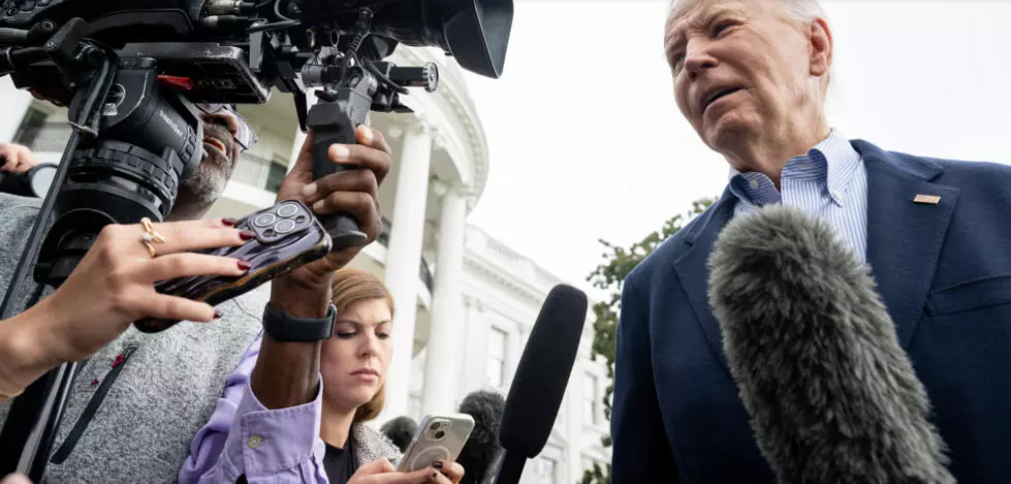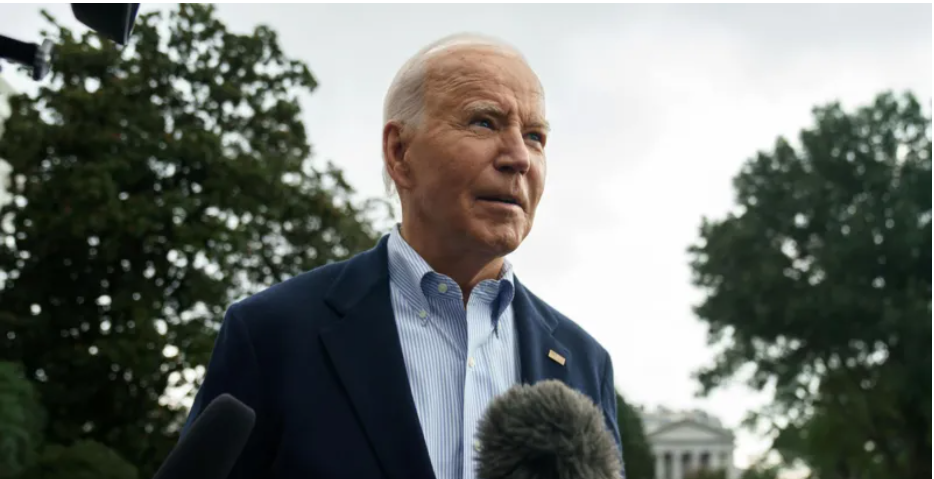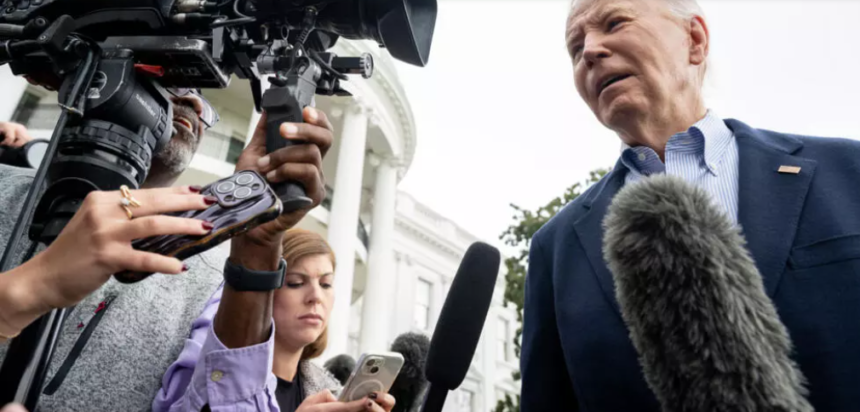Biden’s Cautious Diplomacy a significant development in international relations, U.S. President Joe Biden has revealed that discussions are ongoing regarding potential Israeli strikes on Iran’s oil facilities. This announcement comes amid rising tensions in the Middle East, as Iran’s nuclear ambitions and its support for militant groups in the region continue to provoke concerns among Western powers and their allies. The implications of these discussions are far-reaching, raising questions about the stability of the region, the potential for military conflict, and the impact on global oil markets.
The Context: Rising Tensions in the Middle East
The backdrop to Biden’s remarks is a complex web of geopolitical tensions that have been escalating for years. Iran’s nuclear program has long been a focal point of international concern, particularly since the U.S. withdrew from the Joint Comprehensive Plan of Action (JCPOA) in 2018. In response to sanctions and international pressure, Iran has increased its uranium enrichment activities, leading to fears that it may soon develop nuclear weapons capabilities.
In addition to its nuclear ambitions, Iran’s support for groups such as Hezbollah in Lebanon and Hamas in Gaza has further destabilized the region. Israeli officials have repeatedly expressed their commitment to preventing Iran from gaining nuclear weapons and curbing its influence in the region, even if it means taking military action. As tensions simmer, the prospect of an Israeli strike on Iranian oil facilities adds another layer of complexity to an already volatile situation.
Biden’s Statement: A Diplomatic Balancing Act
During a recent press briefing, President Biden acknowledged that discussions are taking place regarding potential Israeli military action against Iranian oil facilities. He emphasized that while the U.S. supports Israel’s right to defend itself, Biden’s Cautious Diplomacy any military action must be carefully considered in terms of its broader implications for regional stability.
Biden’s comments reflect a cautious approach to U.S. involvement in the Middle East. The president is navigating a delicate balance between supporting a key ally in Israel while also seeking to avoid a wider conflict that could embroil the U.S. in another protracted military engagement in the region. His administration has faced criticism from both sides of the political aisle, Biden’s Cautious Diplomacy with some advocating for stronger action against Iran and others urging restraint and diplomacy.
The Strategic Importance of Iran’s Oil Facilities
Iran’s oil facilities are a vital component of the country’s economy, contributing significantly to its revenue and global oil supply. Any military action targeting these facilities would not only impact Iran’s economic stability but also reverberate throughout the global oil market. A disruption in Iranian oil production could lead to increased prices and supply shortages, Biden’s Cautious Diplomacy affecting economies worldwide.  For the more information click on this link
For the more information click on this link
The strategic significance of Iran’s oil infrastructure makes it a logical target for Israeli strikes, particularly if Tehran continues to defy international demands regarding its nuclear program. However, targeting these facilities also poses considerable risks, Biden’s Cautious Diplomacy including the potential for retaliation by Iran against Israel or U.S. interests in the region.
The Potential for Escalation: A Dangerous Game
The possibility of Israeli strikes on Iranian oil facilities raises concerns about the potential for a broader military conflict. Iran has demonstrated its capability and willingness to respond to perceived threats, Biden’s Cautious Diplomacy whether through direct military action or by leveraging its network of proxy forces throughout the Middle East.
Should Israel launch strikes on Iranian facilities, Iran could retaliate against Israeli targets, U.S. military installations, or its allies in the region. Such a scenario could quickly spiral out of control, Biden’s Cautious Diplomacy leading to a larger military confrontation that could engulf the entire region.
The Role of Regional Powers
The involvement of regional powers complicates the situation further. Countries such as Saudi Arabia and the United Arab Emirates, which view Iran as a primary adversary, may support Israeli action or even take measures of their own in response to perceived threats. Conversely, Biden’s Cautious Diplomacy nations like Russia and China, which have cultivated closer ties with Iran, may seek to intervene or provide support to Tehran in the event of an Israeli strike.
The potential for a multi-front conflict is a daunting prospect for U.S. policymakers, who must carefully weigh their options and consider the broader implications of any military action. The Biden administration has expressed its commitment to working with regional allies to counter Iranian influence, Biden’s Cautious Diplomacy but the path forward remains fraught with challenges.
Diplomatic Efforts: A Path to De-escalation
Amid the rising tensions and discussions of military action, the Biden administration is also emphasizing the importance of diplomatic efforts to address the situation. U.S. officials have reiterated their commitment to engaging with Iran through negotiations aimed at reviving the JCPOA and curbing its nuclear program.
Biden’s approach contrasts sharply with the previous administration’s strategy, which focused on maximum pressure through sanctions. While the path to diplomacy is complex and fraught with obstacles, Biden’s Cautious Diplomacy the administration believes that dialogue is essential for reducing tensions and preventing conflict.
The U.S. has been working to coordinate with European allies and other stakeholders to present a united front in negotiations with Iran. Engaging in talks that encompass not only Iran’s nuclear program but also its regional activities and support for proxy groups will be critical for achieving a comprehensive agreement.
The Role of Congress: Oversight and Influence
As discussions regarding potential military action unfold, Congress plays a crucial role in shaping U.S. policy toward Iran and Israel. Lawmakers from both parties have expressed strong opinions on the issue, Biden’s Cautious Diplomacy with many advocating for a robust response to Iran’s actions while others caution against escalating tensions.
Congressional oversight of military action is a critical component of the U.S. system of checks and balances. Any decision to authorize military strikes against Iran would require careful consideration and consultation with lawmakers. The Biden administration is likely to face intense scrutiny as it navigates these complex dynamics.
Public Opinion: A Divided Nation
Public opinion on U.S. involvement in the Middle East remains divided. Many Americans are weary of military engagements in the region, recalling the protracted conflicts in Iraq and Afghanistan. Concerns about the potential costs, both human and financial, influence public sentiment toward any proposed military action.
At the same time, there is a strong desire among certain segments of the population to support allies like Israel and take a firm stance against Iran’s actions. As the administration contemplates its next steps, Biden’s Cautious Diplomacy it must consider the implications of public opinion and the broader national interest.  For the more information click on this link
For the more information click on this link
The Economic Implications: A Global Perspective
The potential for Israeli strikes on Iranian oil facilities carries significant economic implications, Biden’s Cautious Diplomacy both regionally and globally. A disruption in Iranian oil production could lead to increased prices and volatility in the oil market, affecting economies worldwide.
Oil prices are already sensitive to geopolitical developments, and any military action could exacerbate existing supply chain challenges. Economists and market analysts are closely monitoring the situation, Biden’s Cautious Diplomacy as fluctuations in oil prices could impact inflation and economic growth in various countries.
The interconnectedness of the global economy means that the repercussions of any military action will be felt far beyond the borders of the Middle East. Countries that rely on Iranian oil or are heavily invested in the region may find themselves grappling with the fallout of escalating tensions.
Conclusion: A Precarious Path Ahead
President Biden’s acknowledgment of discussions regarding potential Israeli strikes on Iran’s oil facilities underscores the precarious nature of the situation in the Middle East. As tensions rise and the threat of military conflict looms, Biden’s Cautious Diplomacy the Biden administration must carefully navigate a path that balances support for allies with the need for diplomatic engagement.
The stakes are high, and the potential for escalation is ever-present. As the world watches closely, the need for strategic foresight and careful decision-making has never been more critical. In a region characterized by volatility and uncertainty, the pursuit of peace and stability remains an ongoing challenge.
The coming days and weeks will be pivotal in shaping the trajectory of U.S.-Iran relations, regional dynamics, and the broader geopolitical landscape. Whether through military action, diplomacy, Biden’s Cautious Diplomacy or a combination of both, the decisions made now will have lasting implications for the future of the Middle East and beyond. ALSO READ:- Been Waiting for This Moment for a Long Time: Nigar Sultana on Leading Bangladesh Women’s Cricket to New Heights 2024






1вин приложение https://1win6001.ru/ .
1win rossvya http://1win6001.ru .
1win казино 1win казино .
баланс ван вин баланс ван вин .
1win pro 1win pro .
1вин вход с компьютера http://1win6001.ru/ .
мосбет казино http://mostbet6006.ru .
motbet https://www.mostbet6006.ru .
1 win официальный сайт вход https://familyclub.borda.ru/?1-6-0-00002163-000-0-0-1743051813/ .
mostbet apk скачать mostbet6006.ru .
1win официальный сайт вход http://www.alfatraders.borda.ru/?1-0-0-00004932-000-0-0-1743258210 .
1 win alfatraders.borda.ru/?1-0-0-00004932-000-0-0-1743258210 .
1вин https://www.1win6049.ru .
1win мобильная версия сайта 1win мобильная версия сайта .
1win com alfatraders.borda.ru/?1-0-0-00004932-000-0-0-1743258210 .
1win. pro 1win. pro .
1вин официальный мобильная https://alfatraders.borda.ru/?1-0-0-00004932-000-0-0-1743258210/ .
1win официальный сайт регистрация http://www.balashiha.myqip.ru/?1-12-0-00000437-000-0-0-1743258848 .
1win live https://1win6049.ru .
1win официальный сайт скачать 1win официальный сайт скачать .
1wiun http://www.1win6050.ru .
мостбет скачать казино https://svstrazh.forum24.ru/?1-18-0-00000136-000-0-0-1743260517/ .
что делать с бонусным балансом на 1win https://1win6050.ru .
1vin казино https://obovsem.myqip.ru/?1-9-0-00000059-000-0-0-1743051936/ .
1win официальный сайт скачать http://obovsem.myqip.ru/?1-9-0-00000059-000-0-0-1743051936 .
зайти в 1вин https://1win6050.ru .
mostbet.kg mostbet.kg .
1win вход в личный кабинет 1win вход в личный кабинет .
mostbet kg скачать на андроид svstrazh.forum24.ru/?1-18-0-00000136-000-0-0-1743260517 .
1win online http://obovsem.myqip.ru/?1-9-0-00000059-000-0-0-1743051936 .
mostbet.kg http://www.svstrazh.forum24.ru/?1-18-0-00000136-000-0-0-1743260517 .
1вин официальный сайт https://1win6051.ru .
1вин кг http://www.1win6052.ru .
казино 1win http://1win6052.ru/ .
ваучер 1win https://1win6051.ru .
1вин сайт 1вин сайт .
Купить диплом университета!
Мы предлагаем дипломы любой профессии по доступным тарифам. Вы приобретаете документ в надежной и проверенной временем компании. : shockmusik.ru/nastoyashhiy-diplom-kolledzha-ili-tehnikuma
1win rossvya 1win rossvya .
1win.pro 1win.pro .
ван вин https://1win6052.ru .
1win партнерская программа вход 1win партнерская программа вход .
1 win.pro https://1win6053.ru/ .
mostbet игры https://www.mostbet6029.ru .
мостбет кг mostbet6029.ru .
1вин партнерка 1win6053.ru .
1win официальный сайт скачать 1win6053.ru .
поддержка мостбет http://mostbet6030.ru .
мостбет вход mostbet6032.ru .
1win moldova download http://1win5011.ru .
1win.com http://www.1win5011.ru .
1win metode de plată http://1win5011.ru/ .
cazinouri online moldova https://1win5011.ru/ .
1 win.kg https://www.1win6009.ru .
1 вин скачать 1win6009.ru .
1win aplicația https://www.1win5012.ru .
1 win 1 win .
1 вин скачать http://1win6009.ru .
мостбет кыргызстан http://mostbet6012.ru .
mostbet kg скачать на андроид https://mostbet6012.ru .
мостбет кыргызстан скачать http://www.mostbet6012.ru .
официальный сайт 1win http://1win6046.ru .
1вин сайт http://1win6046.ru .
Купить диплом о высшем образовании!
Мы готовы предложить документы ВУЗов, расположенных в любом регионе РФ. Документы выпускаются на “правильной” бумаге высшего качества: mircalemi.net/showthread.phptid=193676
Website – https://lostfiilmtv.ru/